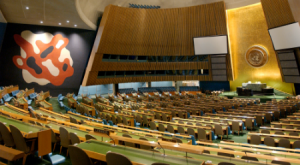The report is focused on recent family policy trends, mainly in the areas of gender-sensitive social protection, work-family balance, gender equality and family homelessness. Good practices in family policymaking by Governments, United Nations entities and civil society are also highlighted.
General Assembly (GA)
 The General Assembly is one of the six main organs of the United Nations, the only one in which all Member States have equal representation: one nation, one vote. All 193 Member States of the United Nations are represented in this unique forum to discuss and work together on a wide array of international issues covered by the UN Charter, such as development, peace and security, international law, etc. In September, all the Members meet in the General Assembly Hall in New York for the annual General Assembly session.
The General Assembly is one of the six main organs of the United Nations, the only one in which all Member States have equal representation: one nation, one vote. All 193 Member States of the United Nations are represented in this unique forum to discuss and work together on a wide array of international issues covered by the UN Charter, such as development, peace and security, international law, etc. In September, all the Members meet in the General Assembly Hall in New York for the annual General Assembly session.
Our work falls under The following main committees of the GA:
1. Second Committee (Economic and Financial Committee)
2. Third Committee (Social, Humanitarian and Cultural Committee)
The report underscores the need to strengthen international cooperation for social development, with particular attention to universal and equitable access to education and health care, and to advance progress in the achievement of the objectives set forth at the World Summit for Social Development and in the 2030 Agenda for Sustainable Development. The report identifies existing gaps and challenges and outlines strategies to align international cooperation to support national policies and strategies to accelerate progress. The outcomes of the fifty-seventh session of the Commission for Social Development are also highlighted in the report, which concludes with policy recommendations for consideration by the Assembly.
The report provides an analysis of ageing-related policies and priorities in the implementation of the 2030 Agenda for Sustainable Development, as reported in the voluntary national reviews presented at the high-level political forum on sustainable development in the period 2016–2018. The report highlights key issues and existing normative frameworks, as well as
challenges and opportunities in responding to the rights and needs of older persons in emergency crises. It also presents updates on advances in issues related to ageing and the implementation of the 2030 Agenda within the United Nations system. The report concludes with key recommendations for consideration by the Assembly.
The report provides an overview of the progress achieved in the implementation of the resolution, with a focus on the following three issues: employment and entrepreneurship, health and well-being, and addressing inequalities and marginalization. The report was prepared on the basis of input received from Member States and relevant United Nations entities. The report concludes with key recommendations for consideration by the Assembly.
 Welcome to the United Nations
Welcome to the United Nations